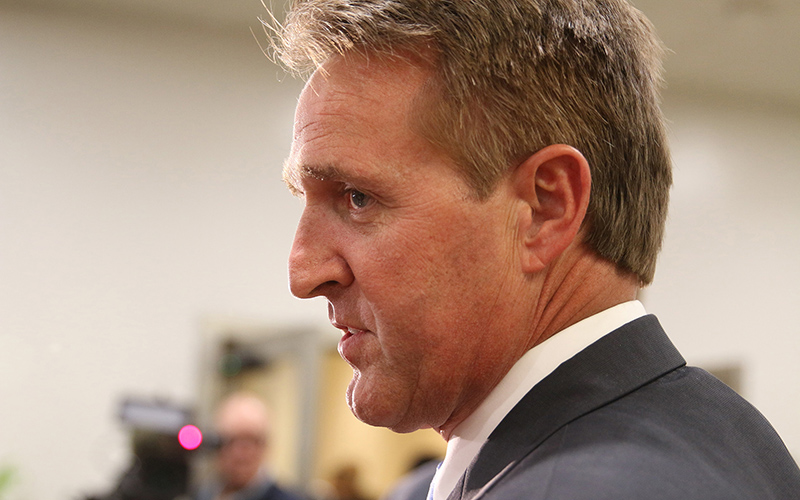WASHINGTON – Arizona Sen. Jeff Flake ended his holdout Friday and agreed to vote for the GOP tax-cut plan, joining fellow Arizona Republican Sen. John McCain and helping Republican leaders get the margin they needed to pass the bill.
The Tax Cuts and Jobs Act would cut taxes by $1.4 trillion over 10 years, but would also add $1 trillion to the deficit, according to one congressional analysis, a number that caused some fiscal conservatives to balk.
But the Senate approved the measure around 1:30 a.m. Saturday on a 51-49 vote after a marathon debate. Flake and McCain supported the bill along with every Republican except Sen. Bob Corker, R-Tennessee, who joined all the Senate Democrats in opposition.
Flake had earlier said that he was worried about the nation’s “already staggering national debt” and that lawmakers needed to enact real tax reform and not just “cut, cut, cut today and assume Congress will grow a backbone later.”
But Friday, he said in a statement from his office that he has long supported corporate tax reductions and other elements of the bill. He said he agreed to support the bill after getting assurances that congressional leaders would do away with an $85 billion “budget gimmick” and that they would work on extending the DACA.
It came one day after McCain announced his support for the bill that “though far from perfect, would enhance American competitiveness, boost the economy and provide long overdue tax relief for middle-class families.”
See related story:
Flake wants to back tax bill if it comes with DACA protections
But critics say low- and middle-income taxpayers will bear the brunt of the bill that will mostly benefit corporations and wealthy taxpayers. They pointed to an analysis by the Tax Policy Center that estimates that 62 percent of the tax cuts in the bill would go to the top 1 percent of taxpayers.
“Even the most optimistic view creates a deficit of over a trillion dollars,” said DJ Quinlan, a spokesman with Arizonans for Tax Fairness. “It’s a pure giveaway to these folks who don’t really need it.”
Quinlan echoed complaints of Senate Democrats who said the bill was “rushed through” without public input and without a chance for Democrats to study it.
“This is purely a partisan act to try to pretend like the Republicans have actually done something after a series of high-profile defeats,” he said.
But McCain said in his statement that the bill was advanced through a process of “regular order,” something he said was lacking in Senate bills that he opposed earlier this year that would have reversed the Affordable Care Act.
The bill would reduce the number of tax brackets and cut the tax rate in each one, and it would reduce the corporate tax rate from 35 percent to 20 percent. Other changes include a limit on the amount of state and local taxes that can be deducted from federal income and elimination of the “individual mandate,” a penalty enacted under the Affordable Care Act that fines taxpayers who do not have health insurance.
“For too long, hardworking people in Arizona and around the country have not seen a raise in their paychecks,” McCain said in his Thursday statement. “This bill would directly benefit all Americans, allowing them to keep a higher percentage of what they earn. According to the non-partisan Joint Committee on Taxation, every income bracket would see tax relief under this bill.”
But critics say that many of the benefits that would be seen by middle-class taxpayers are set to expire after 10 years in the bill.
“They’re compounding the problems,” Quinlan said. “They’re making it worse.”
But McCain discounted claims that the bill would increase the deficit, saying “it’s clear this bill’s net effect on our economy would be positive” because of the boost the tax cuts would give the economy.
Quinlan said the Arizona senators might have acted on the bill after a year of GOP stalemates, because the plan is “not consistent with the things they’ve said in the past.” Neither senator has anything political to lose from the vote: Flake said he will not run for re-election next year, and McCain is battling brain cancer as he continues to work.
As for Flake’s statement that part of his decision was based on an agreement that the White House and congressional leaders would work to protect immigrants who are DACA recipients, Quinlan called that a “ridiculous statement.”
DACA, the Deferred Action for Childhood Arrivals program, protects immigrants from deportation if they were brought here illegally as children. It is currently set to expire on March 5.
“DACA should be passed on its own merit,” Quinlan said. “It’s not an excuse to screw over the middle class.”
The House passed its own version of the bill last month. Differences between it and the Senate version now need to be worked out before the measure can go to the president for his signature.
